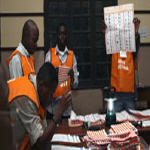
President Joseph Kabila signed into law on Wednesday a bill replacing the Independent Electoral Commission (IEC) with the Independent National Electoral Commission (INEC).
The IEC was created after the 2002 peace accords signed between the government and rebels groups. It has been organizing elections since then, including the 2006 presidential elections and 2005 referendum on the current Constitution. The new Constitution called for the creation of the INEC.
The National Assembly and the Senate passed slightly different bills defining the inner workings of the INEC, respectively in December and February. The bills had to be reconciled before being sent to President Kabila.
Like its predecessor, the INEC is tasked with the organization of the electoral process, including voter registration, maintaining the voter registry, counting of votes, and organization of referendums.
The new commission will have four members from the parliamentary majority and four members from the opposition. Unlike the IEC, there will be no members representing the civil society in the INEC.
The members of the INEC will be chosen by their respective political groups in the National Assembly for a six-year non-renewable term. Once selected, they will no longer be representing their political groups.
The law says that members must be selected from persons who are "independent, recognized for their competence, moral integrity, probity, intellectual honesty, neutrality and impartiality." The selection should also take into account national representation and gender balance.
On the web: Congo News Agency
Related articles
- • DR Congo Citizens Head to Polls to Elect President, Members of Parliament (December 20, 2023)
- • Felix Tshisekedi Sworn In as DR Congo President (January 24, 2019)
- • Constitutional Court Declares Tshisekedi Winner of Presidential Election (January 19, 2019)
- • Martin Fayulu Challenges Presidential Election Results in Court (January 12, 2019)
- • Felix Tshisekedi Vows to Be the President of All Congolese (January 10, 2019)
- • Martin Fayulu Rejects Presidential Election Results (January 10, 2019)
- • Felix Tshisekedi Elected DR Congo President (January 10, 2019)
- • DR Congo Delays Results of December Election (January 6, 2019)
- • Bemba, Katumbi renew their support for joint opposition presidential candidate Fayulu (November 16, 2018)
- • Vital Kamerhe also withdraws support for joint opposition presidential bid (November 12, 2018)
- • Felix Tshisekedi withdraws support for joint opposition presidential bid (November 12, 2018)
- • Jean-Pierre Bemba banned from running for president (August 25, 2018)
- • Vital Kamerhe named UNC presidential candidate (August 4, 2018)
- • Bemba says Katumbi should be allowed to run for president (August 4, 2018)
- • Moise Katumbi blocked from entering DR Congo (August 3, 2018)
- • Jean-Pierre Bemba Returns to DR Congo (August 1, 2018)
- • Jean-Pierre Bemba named MLC presidential candidate (July 13, 2018)
- • Botswana Urges Joseph Kabila to Step Down (February 26, 2018)
- • No elections in DR Congo in December without electronic voting machines: INEC (February 13, 2018)
- • US Warns DR Congo Against Electronic Voting for Delayed Election (February 12, 2018)
- • Presidential election scheduled for December 23, 2018 (November 5, 2017)
- • Felix Tshisekedi accuses INEC of illegally prolonging Kabila's mandate (October 24, 2017)
- • DRC Seeks Arrest of Presidential Candidate Moise Katumbi (May 19, 2016)
- • Papa Wemba Is Buried in Kinshasa (May 4, 2016)
- • Papa Wemba Awarded Highest National Honor as Thousands Pay Tribute (May 2, 2016)
- • Political tensions 'running high' in DR Congo ahead of 2016 elections (October 7, 2015)
- • Rights Groups: DR Congo Must Free Pro-democracy Activists (April 13, 2015)
- • Electoral commission sets DR Congo presidential election date (February 12, 2015)
- • Police Open Fire on Crowd Protesting Election Law Change (January 19, 2015)
- • Etienne Tshisekedi Evacuated to Belgium for Medical Treatment (August 16, 2014)







